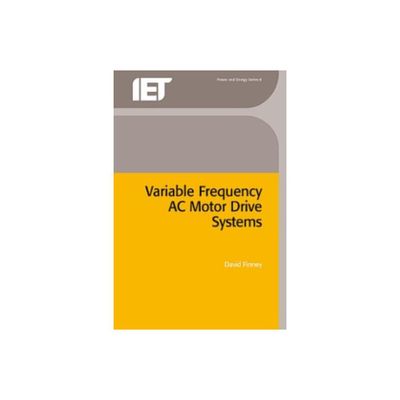Home
Design and Control of Electrical Motor Drives
Loading Inventory...
Barnes and Noble
Design and Control of Electrical Motor Drives
Current price: $96.85


Barnes and Noble
Design and Control of Electrical Motor Drives
Current price: $96.85
Loading Inventory...
Size: OS
*Product Information may vary - to confirm product availability, pricing, and additional information please contact Barnes and Noble
I am very happy to have this Special Issue of the journal
Energies
on the topic of Design and Control of Electrical Motor Drives published. Electrical motor drives are widely used in the industry, automation, transportation, and home appliances. Indeed, rolling mills, machine tools, high-speed trains, subway systems, elevators, electric vehicles, air conditioners, all depend on electrical motor drives.However, the production of effective and practical motors and drives requires flexibility in the regulation of current, torque, flux, acceleration, position, and speed. Without proper modeling, drive, and control, these motor drive systems cannot function effectively.To address these issues, we need to focus on the design, modeling, drive, and control of different types of motors, such as induction motors, permanent magnet synchronous motors, brushless DC motors, DC motors, synchronous reluctance motors, switched reluctance motors, flux-switching motors, linear motors, and step motors.Therefore, relevant research topics in this field of study include modeling electrical motor drives, both in transient and in steady-state, and designing control methods based on novel control strategies (e.g., PI controllers, fuzzy logic controllers, neural network controllers, predictive controllers, adaptive controllers, nonlinear controllers, etc.), with particular attention to transient responses, load disturbances, fault tolerance, and multi-motor drive techniques. This SI include original contributions regarding recent developments and ideas in motor design, motor drive, and motor control. The topics include motor design, field-oriented control, torque control, reliability improvement, advanced controllers for motor drive systems, DSP-based sensorless motor drive systems, high-performance motor drive systems, high-efficiency motor drive systems, and practical applications of motor drive systems. I want to sincerely thank authors, reviewers, and staff members for their time and efforts.
Energies
on the topic of Design and Control of Electrical Motor Drives published. Electrical motor drives are widely used in the industry, automation, transportation, and home appliances. Indeed, rolling mills, machine tools, high-speed trains, subway systems, elevators, electric vehicles, air conditioners, all depend on electrical motor drives.However, the production of effective and practical motors and drives requires flexibility in the regulation of current, torque, flux, acceleration, position, and speed. Without proper modeling, drive, and control, these motor drive systems cannot function effectively.To address these issues, we need to focus on the design, modeling, drive, and control of different types of motors, such as induction motors, permanent magnet synchronous motors, brushless DC motors, DC motors, synchronous reluctance motors, switched reluctance motors, flux-switching motors, linear motors, and step motors.Therefore, relevant research topics in this field of study include modeling electrical motor drives, both in transient and in steady-state, and designing control methods based on novel control strategies (e.g., PI controllers, fuzzy logic controllers, neural network controllers, predictive controllers, adaptive controllers, nonlinear controllers, etc.), with particular attention to transient responses, load disturbances, fault tolerance, and multi-motor drive techniques. This SI include original contributions regarding recent developments and ideas in motor design, motor drive, and motor control. The topics include motor design, field-oriented control, torque control, reliability improvement, advanced controllers for motor drive systems, DSP-based sensorless motor drive systems, high-performance motor drive systems, high-efficiency motor drive systems, and practical applications of motor drive systems. I want to sincerely thank authors, reviewers, and staff members for their time and efforts.


















